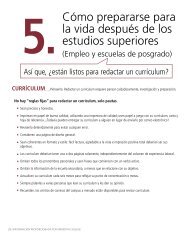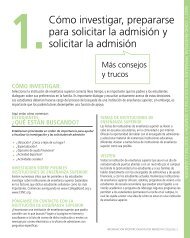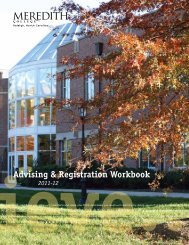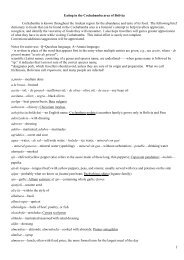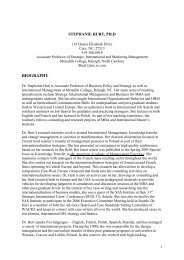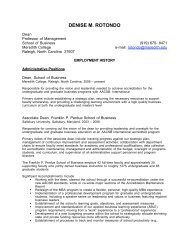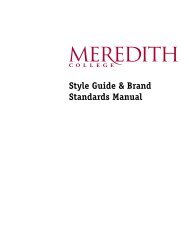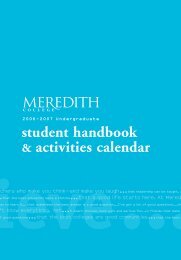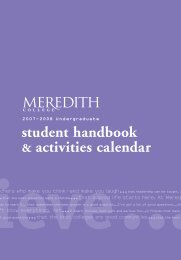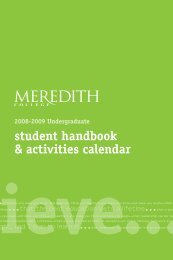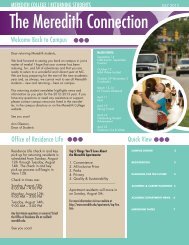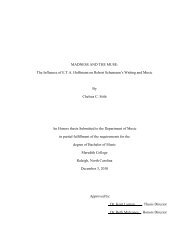Basic Will Preparation Guide - Meredith College
Basic Will Preparation Guide - Meredith College
Basic Will Preparation Guide - Meredith College
Create successful ePaper yourself
Turn your PDF publications into a flip-book with our unique Google optimized e-Paper software.
<strong>Basic</strong> <strong>Will</strong> <strong>Preparation</strong> <strong>Guide</strong>
<strong>Basic</strong><br />
<strong>Will</strong> <strong>Preparation</strong><br />
<strong>Guide</strong><br />
Your Last <strong>Will</strong> and Testament<br />
Writing a will should be as normal as planning an<br />
insurance program or a savings schedule. Because death<br />
is a normal part of life, preparing for it should not<br />
create anxiety.<br />
Your will is one of the most important documents you<br />
will ever sign. It alone speaks with authority after your<br />
death. It is a final expression of your love for family.<br />
What is a <strong>Will</strong>?<br />
A will is a written document in which a person states<br />
how possessions and property are to be distributed after<br />
death. It also names the person who will manage your<br />
estate. It should accomplish two things:<br />
• Distribute property according to your wishes.<br />
• Distribute property as economically as possible.<br />
A will takes effect only upon death. As long as you live,<br />
it does not transfer or give to others any rights to your<br />
property.<br />
2 <strong>Basic</strong> <strong>Will</strong> <strong>Preparation</strong> <strong>Guide</strong> <strong>Meredith</strong> <strong>College</strong><br />
All of us have goals for ourselves and our family. Do you want to<br />
leave them to chance or circumstance? Of course not.<br />
We can make plans now which can affect the goals that we have<br />
and how they are realized during our lifetime and beyond. The<br />
basic component for our planning is a will. Unfortunately, many<br />
people die without a will. This leaves reaching our goals in the<br />
hands of the individual states in which we reside.<br />
<strong>Will</strong> preparation does not have to be complicated. Information<br />
in this brochure will assist you in meeting with your attorney in<br />
order to keep your goals a reality.<br />
Who May Make A <strong>Will</strong>?<br />
Almost every adult may, and should, make a will. Most<br />
states require that the testator:<br />
• Be old enough. Eighteen is the minimum age.<br />
• Be rational enough to realize what one is doing,<br />
to know what one owns and to have some plan for<br />
its distribution.
Why Should You Have A <strong>Will</strong>?<br />
Your property will go to those you want to have it.<br />
There is no other way for you to have this assurance.<br />
Friction and arguments will be lessened.<br />
The potential for large legal fees and court costs can<br />
be minimized. The bulk of the estate will then go to<br />
the heirs.<br />
The estate will probably be settled more promptly.<br />
You can name an executor/executrix to manage your<br />
estate. It will then be someone in whom you have<br />
confidence. Choose someone who possesses the ability<br />
to manage financial affairs. This may be your spouse,<br />
but whoever you name can be made familiar with your<br />
wishes before death. Don’t ever “surprise” someone by<br />
naming them Executor without their knowledge.<br />
Persons with children can name a guardian to care<br />
for their children and to manage their affairs in case<br />
they die simultaneously. Often couples will make<br />
this a reciprocal agreement, naming another couple<br />
with whom they are friends and who also have minor<br />
children.<br />
Executors can be named without bond. Bonds for<br />
court-appointed administrators can be costly, depleting<br />
the estate of funds needed for care of loved ones or for<br />
bequests made in the will.<br />
A will is the best way for you to remember your<br />
college, church or any charitable cause with a gift<br />
after your death.<br />
What Happens If There Is No <strong>Will</strong>?<br />
If there is no will, property will be disposed of<br />
according to the laws of your state. Someone will<br />
be appointed by the court to administer your estate.<br />
Someone will be appointed guardian of minor children.<br />
A bond will be required. It is possible that your wishes<br />
for the distribution of your property will be negated.<br />
A properly drawn will is the best way to ensure your<br />
desires will be satisfied.<br />
Who Should Prepare A <strong>Will</strong>?<br />
You may legally draw your own will. A handwritten<br />
will (holographic) is legal, but it may be costly and<br />
unwise. An attorney who is experienced in wills and<br />
estate planning can advise you properly and can put the<br />
will in language that says what you intend. After your<br />
death you cannot explain your intent. The attorney will<br />
be familiar with the laws of your state. An attorney’s<br />
assistance is of vital importance.<br />
Discuss the fee with your attorney. Cost will be<br />
determined by the time and effort required. The<br />
complexity of the will is also a factor. You can save<br />
time and may save money if you have all the necessary<br />
information available when you meet with the attorney.<br />
When Should A <strong>Will</strong> Be Changed?<br />
Your will should be changed when any circumstances of<br />
life change. When you marry or have children – when<br />
there is a death of a relative – or when there is a divorce,<br />
you should examine your will to see if it meets your<br />
new circumstances.<br />
When your legal residence changes to another state<br />
– when your financial situation changes greatly – and<br />
when tax laws are revised, your will probably requires<br />
some changes.<br />
Your will should be reviewed periodically and then<br />
changed to reflect the current situation. It may be<br />
accomplished by having a new will drawn or by the<br />
addition of a codicil. Never write in changes or scratch<br />
out words of an existing will.<br />
<strong>Basic</strong> <strong>Will</strong> <strong>Preparation</strong> <strong>Guide</strong> <strong>Meredith</strong> <strong>College</strong> 3
What Happens<br />
If One Dies<br />
Without a <strong>Will</strong>?<br />
Situations That Matter When<br />
You Have No <strong>Will</strong><br />
Guardianship<br />
Situation: Both parents of minor children die<br />
simultaneously. What assurance do they have that the<br />
court will appoint a guardian that they would want?<br />
None. Generally the court will appoint next-of-kin, but<br />
it is not required. If there are two sets of grandparents,<br />
that raises an issue for an impersonal clerk of the court<br />
to resolve.<br />
Personal Representative<br />
(Administratrix/Administrator)<br />
When there is no will, the court appoints a personal<br />
representative, who you do not know, to manage your<br />
estate.<br />
Expenses of Probate<br />
A will does not increase probate expenses. Rather, it<br />
frequently reduces expenses. The court must determine<br />
who the legal heirs are if there is no will and must rule<br />
on the will if there is one. So, your heirs must go to<br />
court in either case. Without a will, the court’s decision<br />
may be delayed. Red tape may be cut more readily if<br />
one has a will.<br />
4 <strong>Basic</strong> <strong>Will</strong> <strong>Preparation</strong> <strong>Guide</strong> <strong>Meredith</strong> <strong>College</strong><br />
It may surprise you, but you do have a will. The state has written<br />
a will for all who neglect or refuse to make their own. When you<br />
die without a will (or die “intestate”, as the law calls it), all your<br />
property will be distributed according to the laws of your state.<br />
You do not determine who gets your property – the inheritance<br />
statute does.<br />
The “State’s will” may not fit your wishes. It may even deny them.<br />
The law was written to do the most good for the most people. It<br />
may cause hardship for your loved ones. The law provides a rigid<br />
formula for distribution. It knows nothing about the personal needs<br />
and circumstances of your survivors. There will be lots of red tape<br />
and expense, and the state necessarily moves slowly. It doesn’t<br />
trust anyone and the law applies to everyone alike – good or bad,<br />
honest or deceitful. The law must anticipate and provide against<br />
every possible kind of human deceit.<br />
Expenses of Bonding<br />
Whoever is named by the court administratrix/<br />
administrator, (even your spouse) may be required to<br />
file an annual bond. Amount of bond is determined<br />
by a formula applied to the value of personal property.<br />
With a will you could specify they serve without bond.<br />
Estate Too Small To Require A <strong>Will</strong><br />
If you own any property at all – car, furniture, equity in<br />
a house, savings – you would do well to have a will. The<br />
less you have, the better care you should take of it.<br />
Common Disaster<br />
Situation: In our mobile society, it is possible for a<br />
family to die in a common accident. A couple with no<br />
children is killed in an auto accident. They have no will.<br />
What happens to their estate?<br />
Solution: Intestate laws will govern each of the estates<br />
(husband and wife). The interaction of these two estates<br />
can be very complex. A will helps with the complexities<br />
of the estates.<br />
Surviving Spouse And Her/His Absolute<br />
Right To Net Estate<br />
There is no such absolute right. The laws of the state<br />
will prevail.
The following chart is according to North Carolina laws of Intestacy Succession. Please check the laws of your state to<br />
determine if there is a difference in the distribution of property.<br />
Distribution of Property According to<br />
North Carolina Laws of Intestacy Succession<br />
Survivor(s) Distribution of Property<br />
Spouse and one child They will each receive a one-half undivided interest<br />
in real estate. Spouse receives first $30,000 of<br />
personal property; the balance will be shared equally.<br />
Spouse and two or more children Spouse receives one-third undivided interest in all real<br />
estate, children receive equal undivided interests in the<br />
remaining two thirds. Spouse receives first $30,000 of<br />
personal property; balance is divided one-third to spouse and<br />
two-thirds equally among the children.<br />
Spouse and parents of the Spouse receives one-half undivided interest in real<br />
decedent no children estate; parents receive one-half undivided interest.<br />
Spouse receives first $50,000 of personal property;<br />
balance is divided one-half to spouse and one-half<br />
to parents.<br />
Spouse and sisters and brothers of All of net estate to spouse.<br />
decedent – no children or parents<br />
Children, parents, sisters and Net estate divided evenly among children.<br />
brothers – no spouse<br />
Parents, sisters and brothers – no spouse Net estate to parents of decedent.<br />
Sisters and brothers – no spouse Net estate divided equally among sisters and brothers<br />
and/or the lineal descendants of deceased sisters and<br />
brothers.<br />
No heirs Estate passes to the state of North Carolina to aid<br />
certain students enrolled in public institutions of<br />
higher learning in North Carolina.<br />
<strong>Basic</strong> <strong>Will</strong> <strong>Preparation</strong> <strong>Guide</strong> <strong>Meredith</strong> <strong>College</strong> 5
Preparing<br />
for Making<br />
a <strong>Will</strong><br />
What to do before you see your lawyer<br />
Making a will is not a do-it-yourself project. To obtain a will, custom-made for you, consult your<br />
attorney. In the privacy of your home, determine your own desires for distribution of your estate.<br />
Write down your wishes. Then take these notes to your attorney and tell her or him what you want<br />
to do. Give her or him details of your estate, of your family situation and the causes you wish to<br />
remember in your will.<br />
This task is to make your personal wishes legal. Attorneys charge for their time and knowledge.<br />
The more time you can save your attorney, the less the cost should be. Take along all the basic<br />
information that will be needed, in written form, so you may spend less time in her or his office.<br />
But, inquire in advance about legal fees. It is a routine question you are expected to ask. The fee<br />
will certainly be less than the cost of not having a will.<br />
The following outline will help you gather the needed information. Write it out. Inventory your estate. And then don’t delay.<br />
Put it in the hands of an attorney who is competent in the field of wills and estate planning.<br />
Information Needed<br />
1. Full name and address of testatrix/testator (person making the will, female/male)<br />
2. Date of birth and marital status<br />
3. Name of spouse, if married<br />
4. Names of living relatives to be named in the will. Give birth dates of minor children. An attorney will need to<br />
know names of all children, even if a child is to be omitted from the will. The attorney will advise you of<br />
precautions needed in such an event. Specify relationship of relatives and give current address for each person<br />
named as a beneficiary.<br />
5. Provide names and addresses of others to be included in the will.<br />
6. List specific bequests to be made to each of those persons listed above. Describe the gift, the amount of money<br />
or percentage of the estate to each recipient.<br />
7. The will provides an opportunity to make a final gift to your favorite cause which will probably be substantially<br />
larger than that which is possible in life. If desired, an institution or cause can be named as recipient of all or<br />
a portion of that which you designate. In such an event, the full legal name and address of the organization should<br />
be available.<br />
8. Name the institution or cause(s) you wish to include in your will. Designate the amount or percentage of the<br />
estate or describe the gift.<br />
9. If all of your estate is not specifically designated in the above manner, then a residual beneficiary should be<br />
decided upon. Frequently, the largest portion of one’s estate will be distributed under this section of the will.<br />
Normally the distribution will be expressed in percentages. The cause(s) named in (7) above could well be the<br />
residual beneficiary.<br />
10. If minor children are living at the time of making a will, you should name a guardian for their care. If husband and<br />
wife wish the other to be guardian of their children, they should specifically name each other in the will. An<br />
alternate guardian should also be named.<br />
11. Appoint your executrix/executor. Husband and wife often name each other. Specify if they will serve without<br />
being bonded in administering your estate. Again an alternate should be named.<br />
12. Because there is always the possibility of a common disaster in which you, your spouse and your children could<br />
be killed simultaneously, a paragraph in the will can provide for the trust to be established with the proceeds<br />
of your estate, and the income can benefit:<br />
a) Immediately, an institution or cause(s) of your choice.<br />
b) Your parents or other family members for their lifetime, and then the institution or cause(s) in perpetuity.<br />
6 <strong>Basic</strong> <strong>Will</strong> <strong>Preparation</strong> <strong>Guide</strong> <strong>Meredith</strong> <strong>College</strong>
A Bequest Planning <strong>Guide</strong><br />
<strong>Meredith</strong> <strong>College</strong> gratefully accepts gifts for the benefit of the <strong>College</strong> whether made by cash, trust or bequest. Below you will<br />
find sample language to use when creating a bequest for <strong>Meredith</strong>. We hope these examples will be helpful to your attorney.<br />
Specific endowment agreements may be established at the same time the will is completed. Please contact the Office of Gift<br />
Planning for assistance.<br />
Scholarship or Endowment Fund:<br />
A gift through which you can honor the memory of someone you admire:<br />
I give, devise and bequeath to <strong>Meredith</strong> <strong>College</strong>, an educational institution incorporated under the laws of the state of North<br />
Carolina, located at 3800 Hillsborough Street, Raleigh, North Carolina 27607, [the sum of $_________/property equal in<br />
value to _________ percent of my residuary estate/real estate located at ___________________________ and more fully<br />
described on Exhibit A attached hereto/ _________ shares of ___________________ stock] to constitute a fund known as<br />
the __________________________ Scholarship. This fund will be invested by the Board of Trustees of <strong>Meredith</strong> <strong>College</strong><br />
and the annual revenue thereof used to support the general educational purposes of the <strong>College</strong> in such a manner as the<br />
Trustees thereof may direct.<br />
Designated Bequest:<br />
A gift to be used for a specific purpose: (Please consult the <strong>College</strong> to be sure the designated bequest can be honored).<br />
I give, devise and bequeath to <strong>Meredith</strong> <strong>College</strong>, an educational institution incorporated under the laws of the state of North<br />
Carolina, located at 3800 Hillsborough Street, Raleigh, North Carolina 27607, [the sum of $_________/property equal in<br />
value to _________ percent of my residuary estate /real estate located at ____________________________and more fully<br />
described on Exhibit A attached hereto/ _________ shares of _________________ stock] to support the program at the<br />
<strong>College</strong> in such a manner as the Trustees thereof may direct.<br />
General Bequest:<br />
A sum of money, property, stocks or a percentage of your estate for unrestricted use:<br />
I give, devise and bequeath to <strong>Meredith</strong> <strong>College</strong>, an educational institution incorporated under the laws of the state of North<br />
Carolina, located at 3800 Hillsborough Street, Raleigh, North Carolina 27607, [the sum of $_________/property equal<br />
in value to _______ percent of my residuary estate /real estate located at ____________________________and more<br />
fully described on Exhibit A attached hereto/ _________ shares of _________________ stock] for its general educational<br />
purposes.<br />
Contingency Bequest:<br />
A gift to an alternate beneficiary in case your designated heirs have died:<br />
I give, devise and bequeath all the rest, residue and remainder of my property, wherever situated and of whatever nature<br />
(including any lapsed devises or bequests or other gifts made by this will which fail for any reason), collectively referred to<br />
herein as my residuary estate, to _________________if she/he survives me. If __________________________ does not<br />
survive me, I give, devise and bequeath my residuary estate to <strong>Meredith</strong> <strong>College</strong>, an educational institution incorporated<br />
under the laws of the state of North Carolina, located at 3800 Hillsborough Street, Raleigh, North Carolina 27607, for its<br />
general educational purposes.<br />
Residuary Bequest:<br />
Money or property left over after specific bequests have been made:<br />
All the rest, residue and remainder of my property, wherever situated and whatever nature (including any lapsed devises or<br />
bequests or other gifts made by this will which fail for any reason), I give, devise and bequeath to <strong>Meredith</strong> <strong>College</strong>, an educational<br />
institution incorporated under the laws of the state of North Carolina located at 3800 Hillsborough Street,<br />
Raleigh, North Carolina 27607, for its general educational purposes.
Thank you for considering <strong>Meredith</strong> <strong>College</strong> in your will.<br />
For more information, please contact:<br />
Harold L. West, CFRE, FLMI<br />
Senior Director of Gift Planning<br />
<strong>Meredith</strong> <strong>College</strong><br />
3800 Hillsborough Street<br />
Raleigh, North Carolina 27607-5298<br />
(919) 760-8372<br />
westh@meredith.edu<br />
www.meredith.edu<br />
Neither the author nor the publisher of this publication is engaged in rendering legal or tax advisory service. For advice and assistance in specific cases, the<br />
services of an attorney or other professional should be obtained. The purpose of this publication is to provide accurate and authoritative information of a<br />
general character only.<br />
Produced by the Office of Marketing and Communications 12-05 05-215



